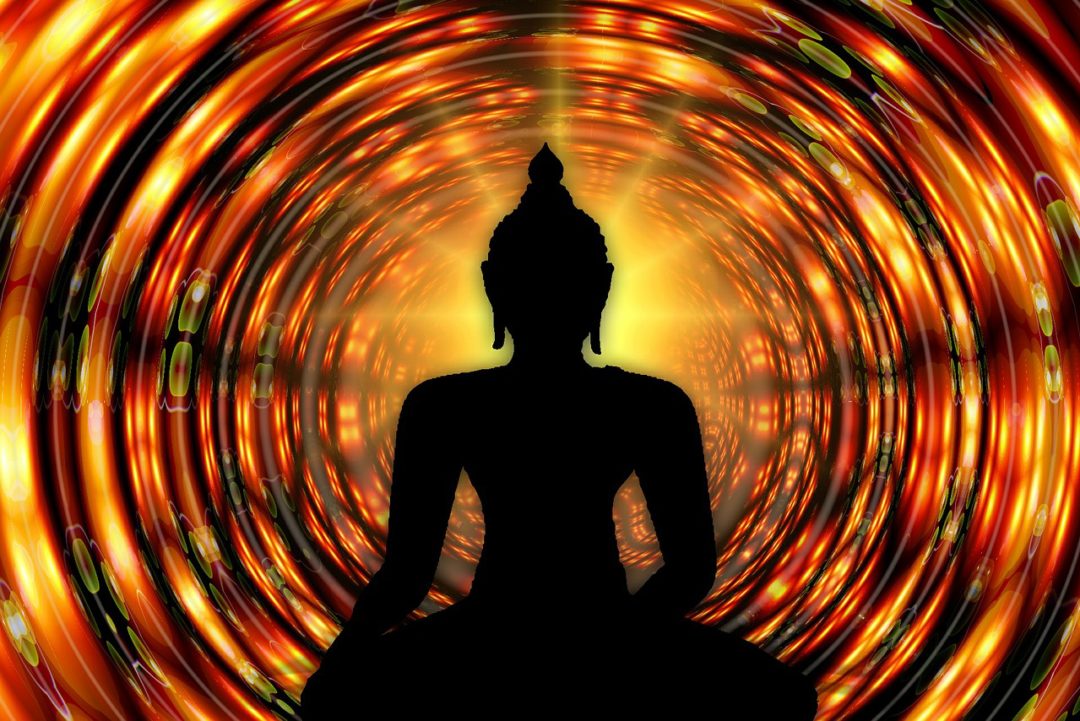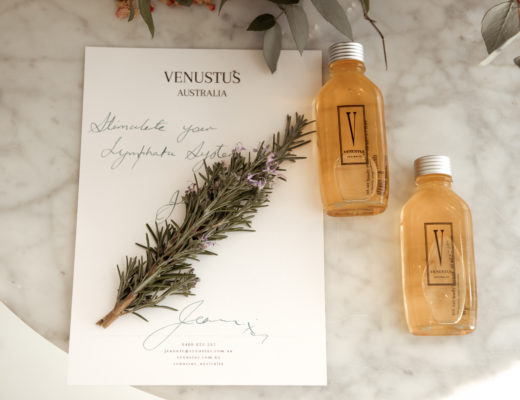Notes from ‘Heart Teachings For a Troubled World’, an urban meditation retreat with Dr B. Alan Wallace
Melbourne, October, 2018
Late last year, after returning to Australia from France, I flew from Sydney to Melbourne to basically move as fast as possible almost on the spot. It was for the Australian Tap Dance Festival where I took a week of repertoire classes, with a bunch of other tap maniacs, that culminated in a fun, flamboyant and percussive gala show. A month later, I returned to do just the opposite- that is to be as still as possible for a week- for an urban meditation retreat entitled ‘Heart Teachings for a Troubled World‘. But this was not just any retreat- this seven day non residential retreat was with Dr. Alan Wallace – the real deal!
I’d first heard of Dr Wallace in 2011 through Lloyd, the sound and lighting guy from Red Bennies, one of the Melbourne venues for my cabaret ‘Parisian Rendez Vous’ . He drove me home one night and told me about the two month retreat he was about to go on in Thailand led by Dr. B Alan Wallace. I spent the summer listening to one entire retreat via podcast which were fascinating and transformative.
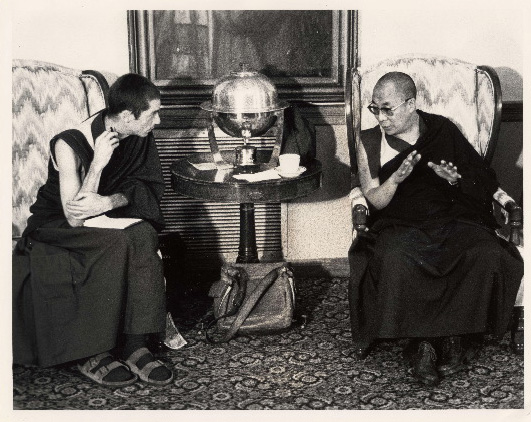
Raised in California, Alan has been a scholar and practitioner of Buddhism since 1970, and has 14 years training as a Tibetan Buddhist monk, ordained by the Dalai Lama.
Image www.alanwallace.org
With a degree is Physics, a doctorate in Religious Studies, Dr Wallace is a prolific writer and translator, author of such books as ‘Meditations of a Buddhist Skeptic’, ‘Mind in the Balance’, ‘Dreaming Yourself Awake’ amongst dozens more. He is a leading figure in debate between Buddhist thinkers and practitioners with the western scientific study of the mind. Dr. Wallace runs the Santa Barbara Institute for Consciousness and is also currently setting up the Centre for Contemplative Research in Tuscany, Italy, an unprecedented research facility dedicated to contemplative and scientific research to address two closely-related questions pertaining to human existence: (1) what is the nature of genuine well-being and (2) what is the nature of human consciousness?
The benefits of meditation are now widely recognised and recommended by doctors and psychologists all over the world.
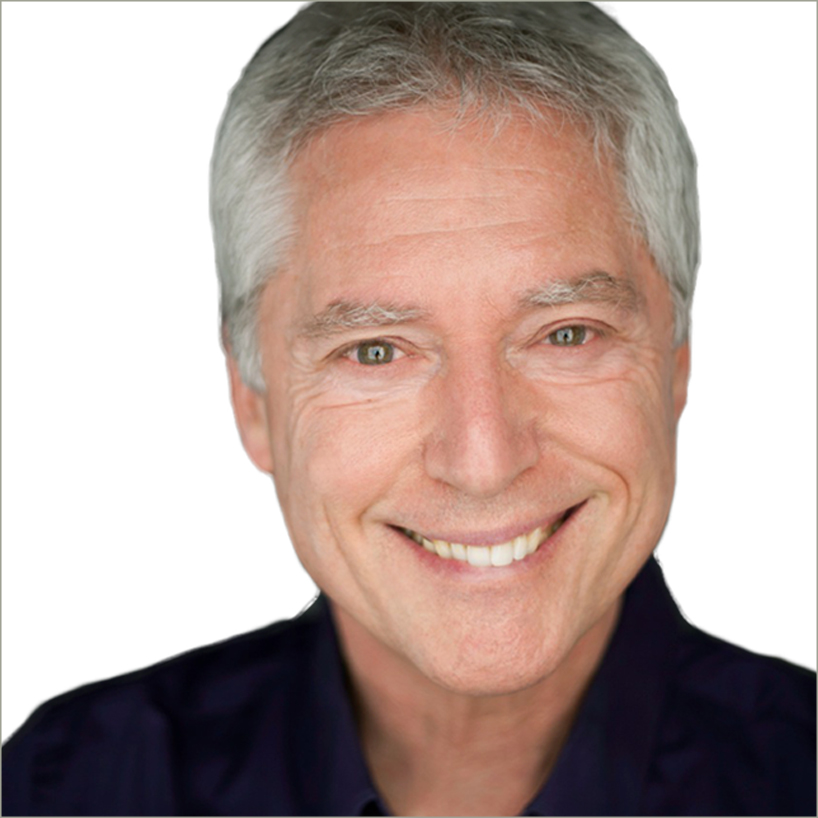
Not only is Alan remarkably and inspiringly educated from without and within through eastern and western forms of learning on this subject- he is exceptionally eloquent. It is a joy to listen to his delicate, precise use of language employed deftly to deliver philosophy and thought through metaphor, anecdote and often humour, always with contagious enthusiasm and curiosity.
This week’s retreat in Melbourne is entitled Heart Teachings for a Troubled World and co-ordinated by The Contemplary (directed by Charles Potter), a not-for-profit organisation created to benefit the community by offering instruction in a range of meditation practices and other forms of contemplation that aim to help people flourish. It is held at the beautiful Abbotsford convent that has been converted into a hub of vegan cafés, galleries, artist workshops, markets and gardens offering an inclusive village vibe and much greenery and birdlife.
The seven-day retreat is divided into four 1.5 hour sessions. We’re asked to come early – as a respect for the teacher and the teachings and tipped to stand when Dr Wallace enters and leaves the stage. We’re invited to bring yoga mats or cushions, blankets and jumpers for the meditations- there will be four x 24 minutes a day within each session.
Day One. After an acknowledgement of country to the Wurundjeri people by Charles, Alan appears (some people call him Dr Wallace but he is also fine with people referring to him simply as Alan). It’s the first time I’ve seen him in the flesh but his voice I know well from the podcasts with lectures and guided meditations from the podcasts and associate it with soft but powerful inner contemplations that they trigger. The anticipation in the room is tangible as if everyone is holding their breaths. A door offstage squeaks, silence ensues, then, clothes in long Tibetan burgundy coloured robes, Alan strides onto stage. He looks around to take us in, bows, says his ritualistic ‘olaso’, smiles and takes a little bow, hands together. Everyone bows back and he gestures for us to be seated.
The participants range from around 25 to around 65 years old, both men and women, some monks, some academics and others from various walks of life, many regular meditators, probably no mediation newbies but some on again/off-again meditators like myself— most are locals but others have travelled from around the country and New Zealand. Most are very familiar with Alan’s work and teachings.
We settle in, some on chairs, some on the floor. I’m rugged up and sitting to the side in front of the sound desk, manned by Lloyd who has mic’ed up Alan and is recording the sessions as an audio archive.
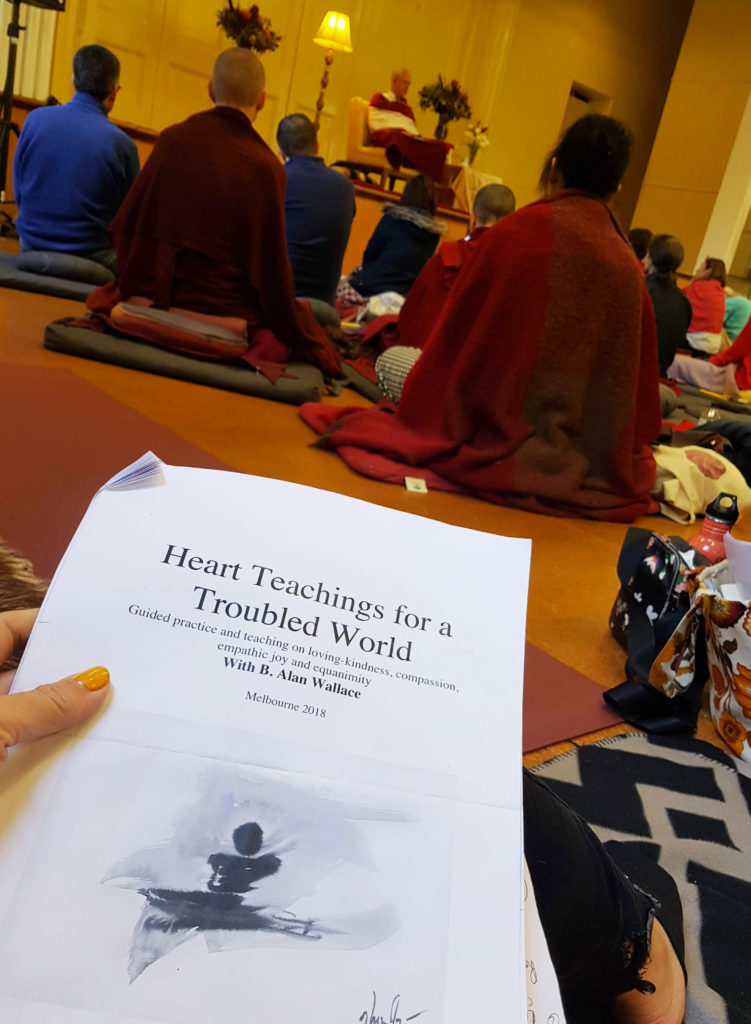
Alan begins to explains the goal of the week.
“There’s an expression ‘if you think money can’t buy you happiness, then you don’t know how to shop’. But can it bring you genuine happiness?…. Not even an inch.”
There’s nothing wrong with some hedonic pleasure, he says, but genuine well-being is not what we get from the world but what we bring to it. In order to gain genuine well-being, then we need to understand and cultivate The Four Immeasurables- “a rich suite of practices that open the heart, counter the distortions in our relationships to ourselves, and deepen our relationships to others”.
1. Loving-Kindness- the aspiration that we find happiness and the causes of happiness;
2. Compassion- not only as an emotion but an aspiration- that we may find freedom from suffering and its causes;
3. Empathetic Joy- taking delight in the successes, the virtues, the joys of others;
4. Equanimity-impartiality and unconditional caring – attending to others regardless of ethnicity, wealth, whether human or animal.
These four are universal virtues, he believes “whatever galaxy one may be born into”. But everything, he reminds us, should lend itself to investigation rather than being dished out as dogma.
Consciousness is the most interesting thing in the world for Alan (he has a whole project dedicated to it as mentioned earlier, The Santa Barbara Institute for Consciousness Studies) and this week we will be contemplating the nature of it.
Our meditations this week will be based around these ‘four immeasurables’ and a number of practices designed to calm, still and bring clarity to the mind.
In hope of developing ‘psychological hygiene’ and to follow the fragrance of inner freedom, we listen intently. Alan’s voice is as usual soft but passionate and I scribble notes madly. It’s been a long time since I’ve been in a lecture of sorts and realise it’s a shame. I feel somewhat to have been transported to Ancient Athens, listening to public philosophies and Socrates. Whether it’s about meditation, philosophy or any other topic really, this intense mental stimulation is meaningful and I’ve missed it (my university lecturers, you can slap my wrists now).
The Buddhist view, says Alan, is that every being is conscious and that we do, naturally, care. There is no ‘off’ switch (not even in death unlike what people who suicide may think). As sentient beings we are aware, conscious, we feel and we care. And through meditation we try to break down the barriers to where that caring ‘stops’ – outside a family, ethnic ground, country etc. We don’t need to learn how to care, we already do. What we can use the meditation for is to expand and extend our capacity for caring. At what point does the caring stop, like water blocked? For sociopaths, it stops at the skin, for racists at the race, others at family, village tribe… How do we open that? We need to recognise where the barriers are and break them down, take our natural loving kindness and expand its scope, breadth and volume; break down the borders so the heart expands and is limitless; plant seeds and nurture them. We’re here this week to open the heart and open the mind.
Alan becomes passionate when talking about the need today, more than ever, for inner voyage as opposed to external fulfilment. “If we continue like this on a self destructive trajectory, it’s suicide of a species. We’re in desperate need of ancient wisdom.”
While there is just one session a day where we are invited to speak- the question time in the last session after the (often silent, non guided) meditation, we’re told we can talk in breaks as this is not a silent retreat. Urban retreats are a good way to practice while maintaining a connection to the ‘outside world’ and we are encouraged to maintain our mindful focus). Non silence shouldn’t interrupt our practice though. I reflect aloud to Lloyd that perhaps spending my evening reviewing restaurants all over town while catching up with various friends isn’t possibly the best of all activities I could have planned, but he says, positively ‘maybe you can mindfully eat all those meals’.
During the next days Alan quotes the Buddha, the Dalai Lama and draws from around 2500 years of wisdom. We listen, think, scribble and laugh. During the meditation he guides us to release tension, maintain stillness and find clarity and focus. We often think we need to tighten up when concentrating, he says, but it’s quite the opposite, we need to relax to concentrate. The meditations teach us how to be deeply relaxed but without dullness. As my mind runs around like a wild rabbit, my stomach bubbles to what seems to me terribly loudly and I use his advice to ‘relax, release and return’. The mind is one of our best assets, he says, so cultivating it is one of the best things we can do. But while we’ll sign up the to gym and look after our bodies why do we neglect to cultivate our minds?
Here is the first meditation. Find a comfortable position sitting or lying (or bookmark it for later).
Alan talks to us about the current global phenomena of anxiety with people feeling they are not rich, famous or powerful enough, causing wide spread depression, especially amongst younger generations. And these meditations are not just to cultivate loving kindness towards others but also are self directed- giving ourselves a hard time is not going to get us anywhere…
Investing just in hedonic satisfaction is like investing in a company you know sooner or later is going to go bankrupt, says Alan. We must develop Dharma – the ability to flourish in the midst of everything- not just when everything external is going well.
It’s too easy to be happy when we’re young, rich and healthy then to become sad when the riches, the health and the youth is taken away. And the idea, we’re told, is to get happier as we go along as we develop Dharma, not of dreading the ageing process and becoming more miserable with years. Sounds good to me! ‘May we each find happiness and the cause of happiness‘, he repeats in several of the meditations. Exploration of inner resources, we’re like miners, he says. But, be careful, don’t get stuck in the well- come back out and practice in the world.
Here another from one from the ‘Fourfold Vision Quest Meditation’ to try now, or later.
The meditation:
• Focus on beings who have not realised the happiness that is their heart’s desire with the wish that they may find such happiness, beginning with yourself following the fourfold quest of loving-kindness:
• With the awareness that there is both hedonic pleasure and genuine well-being, what kind of happiness would you love to experience and sustain?
• With the awareness that you cannot achieve such happiness entirely on your own, what would you love to receive from the world around you to realise such wellbeing?
• With the awareness that you cannot achieve such happiness without meaningful inner transformation, how would you love to grow in order to realise your aspiration?
• With the awareness that you are interrelated with all those around you, in order to bring the greatest meaning to your life, what would you love to offer to the world around you?
We’re told to direct our focus on a variety of people- beginning with ourselves, to loved ones, to people we don’t really care either way for, to those we find difficult to like.
‘Animosity is never quelled with animosity. Animosity is quelled only with the absence of animosity. This is an ancient truth.’ Buddha as quoted by Alan.
Throughout the week, we try to broaden the ‘bandwidth of our mental perception’, try to see things in different ways through meditation, settle our minds and avoid the opposite of the four immeasurables, being being malevolent, cruel, envious/cynical and thinking our own side is the best/most precious.
Cultivate the four immeasurables and you’ll be fine- whether or not there is an afterlife – at least you’re covered’! Alan tells us, laughing.
Each day Alan arrives on stage he performs his little bow then snaps his fingers like a magician. The ritual allows us to be ready to be led through a forest of ideas about the meaning of life, eternal happiness and reflect on consciousness by this wise man with a twinkle in his eye. It’s alluring and even mid week when I’m cold, sore or tired, I soon warm up with this generous sharing of wisdom.
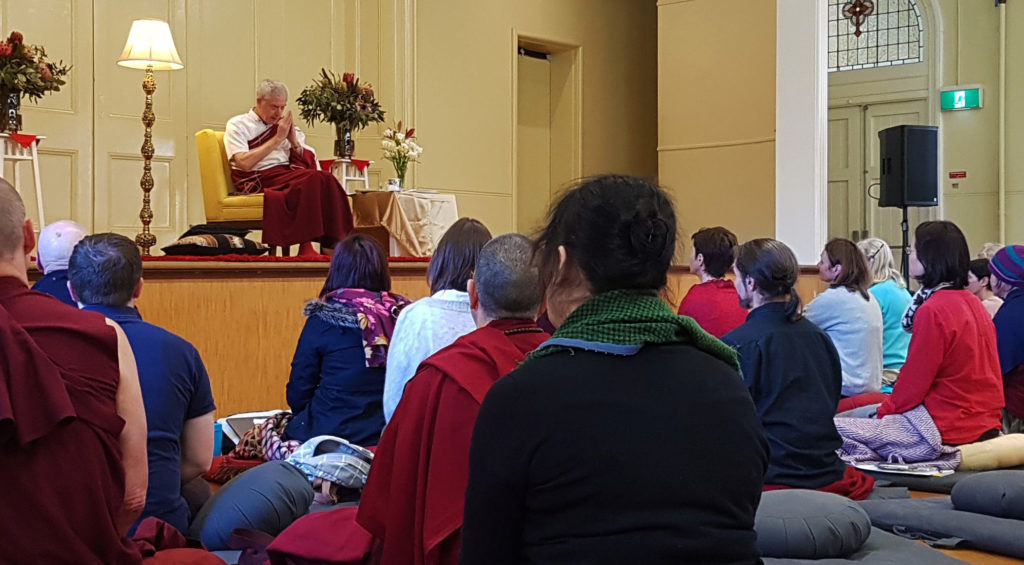
While I have no major ‘breakthrough’ moment, I have a few moments of lightness and profound sensation and thoughts midst meditation and while listening and scribbling.
As the week moves on we move into deeper practice. We try to find the ‘space of the mind’ that occupies our thoughts, detaching from any anxiety and disassociating from mental afflictions in search of a lighter, clearer way to engage with the world. We try to stop grasping- ‘the body is just the body, the mind is just then mind’. We witness and are present. To achieve ‘Shamatha’ is to tap into happiness that comes from within. But no ‘are we there yet’ urges are going to help the process! Then, instead of just resting in Shamatha bliss, we’re told, it’s the base camp of doing meaningful things in the world. Moving further, to cut through delusion, craving, hostility- we may one day arrive at ‘Nirvana’ and irreversible freedom. Once we arise with this passion for freedom then we can see that everyone can be a Buddha and everyone has a potential to be free. It may take a long time, but that’s what multiple lives are for, Alan adds (and laughs). Consciousness just like mass/energy can’t turn into nothing, it can only transform, he says.
Things get even more fascinating as Alan talks about remote viewing, pre cognition and even lucid dying instead of just fading out ‘it’s like reading a novel and sleeping before the last page’.
In a dream, everything feels real and you can’t remember your last dream. So in life, you can’t remember the last. It’s important to awaken ourselves and see the path, the bigger picture and to move forward, irreversibly head towards enlightenment.
Alan throws out the idea that happiness is not necessarily one big huge package but rather is held by those who delights in many small things. It seems so simple. I spend the last days taking time in the breaks to look at flowers, appreciate the hot drinks and meals, reflecting on the comfort of my friend’s house where I’m staying and the time I have to attend such a retreat (by the way, check out the cool bee below, I just noticed).
The second last day we do a ‘contemplative striptease’ – seeking ‘shamata without a sign’. It’s all about doing less (a challenge for the New Yorkers at heart!) ! We’re told to withdraw awareness from the outer focus on respiration, thoughts and feelings. Less again, withdrawing from the 5 senses. Less again to lose interest with the mind. We release and rest with awareness of awareness. From here we should be able to tap into the ‘substrate’ and take a direct path to vividness.
Finally, and just after a slightly depressing moment for me with the mention that if we think we can be free of pain and suffering we’re deluding ourself as we will at some point no doubt get sick, suffer etc. he brings us back to hope and the ‘buddha mind’.
Every sentient being has a capacity to become Buddha, it’s flowing through all of us. It’s not as if Buddha is looking into us but more like that Buddha can dissolve in us- like sugar in tea.
The sun coming out from behind the clouds. It was always there, just blocked. Nirvana is in the the palm of our hand. There is no reason everyone cannot be free of suffering. It’s plausible and possible. As he says this the sun literally does come out from behind the clouds over the vast paddock with horses and gumtrees and shines in to warm the large hall which has been quite cold.
Buddhas apparently keep manifesting as long as there are sentient beings. But how? Kick into gear your Buddha nature, evolve as swiftly as possible and call for blessings and speak to your intuitions. Then there’s this idea we’re given that’s pretty mind bending and meta:
We’re dreaming that we are a sentient being, but really- we are a buddha having a delusion.
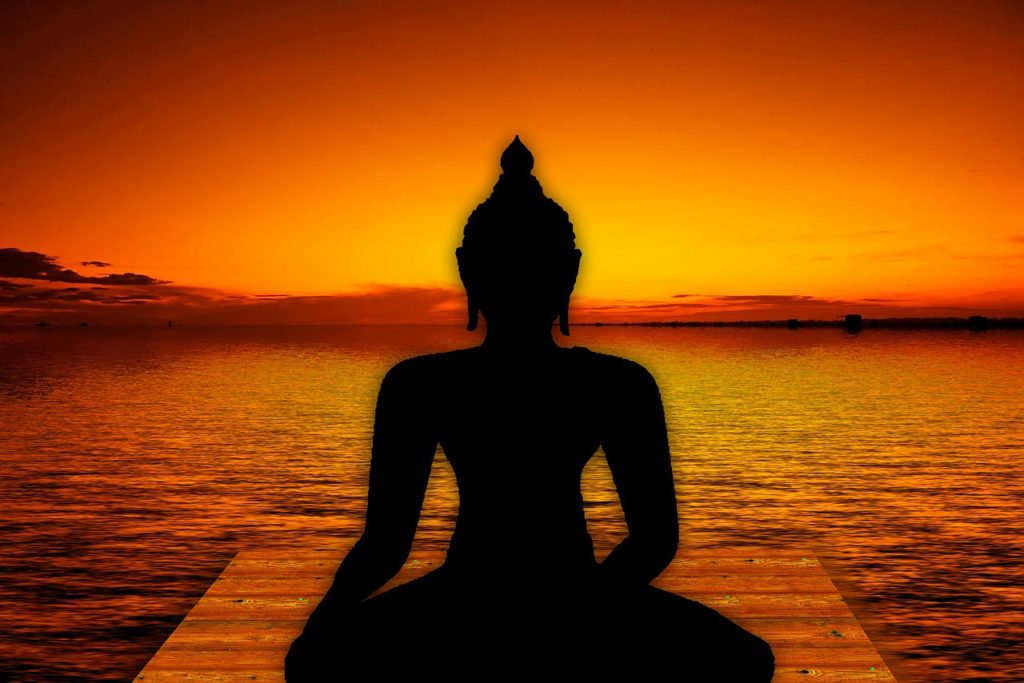
When the week is up I’m not enlightened. That would be momentous after just seven days. But it’s been fascinating and there’s a banquet of food for thought. Notions of reality have been stirred up with curiosity for more contemplation of consciousness.
If this has been helpful then great, if not- no problem, concludes the ever humble Alan. He smiles his cheeky smile, we applaud and line up for a ceremony where we walk on stage one at a time and he places silk scarves over our necks. Most people beam, one woman breaks into wild sobs, comforted by other participants, another woman takes her baby up and it feels profound.
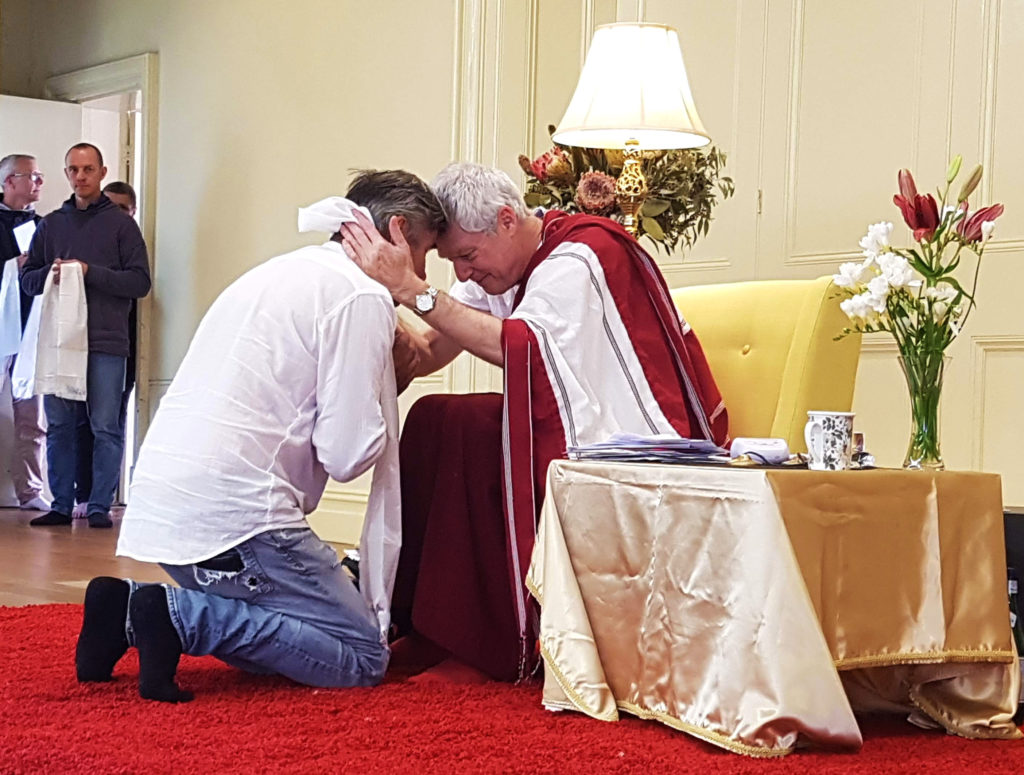
When it’s my turn I suddenly get nervous and wonder if I’m about to have an electric experience- while extremely soft spoken, Alan has an intense vibe and my cool journalist demeanour is cracking. I say ‘it’s nice to see you in the flesh’ and flash a grin. Then kick myself – is this all I could come up with? In the flesh?? Argh. But I don’t think he minds- or even registers too much as there are 150 of us. And besides, it’s true ( but sorry Alan if you ever read this for not finding a more elegant expression).
You too can see Alan in the flesh by checking out his next activities including events in the UK, US, Russia, Europe and Australia.
In the meantimes and thanks to Lloyd, the week’s audio recordings are available here for free for download (but donations welcome) .
Find more about the Contemplorary’s activities here.
More about Alan here.
Finally, here’s a little on Alan’s project he Centre for Contemplative Research (CCR) in Tuscany, for which there was a special talk after the retreat.
Happy meditating and contemplating!

